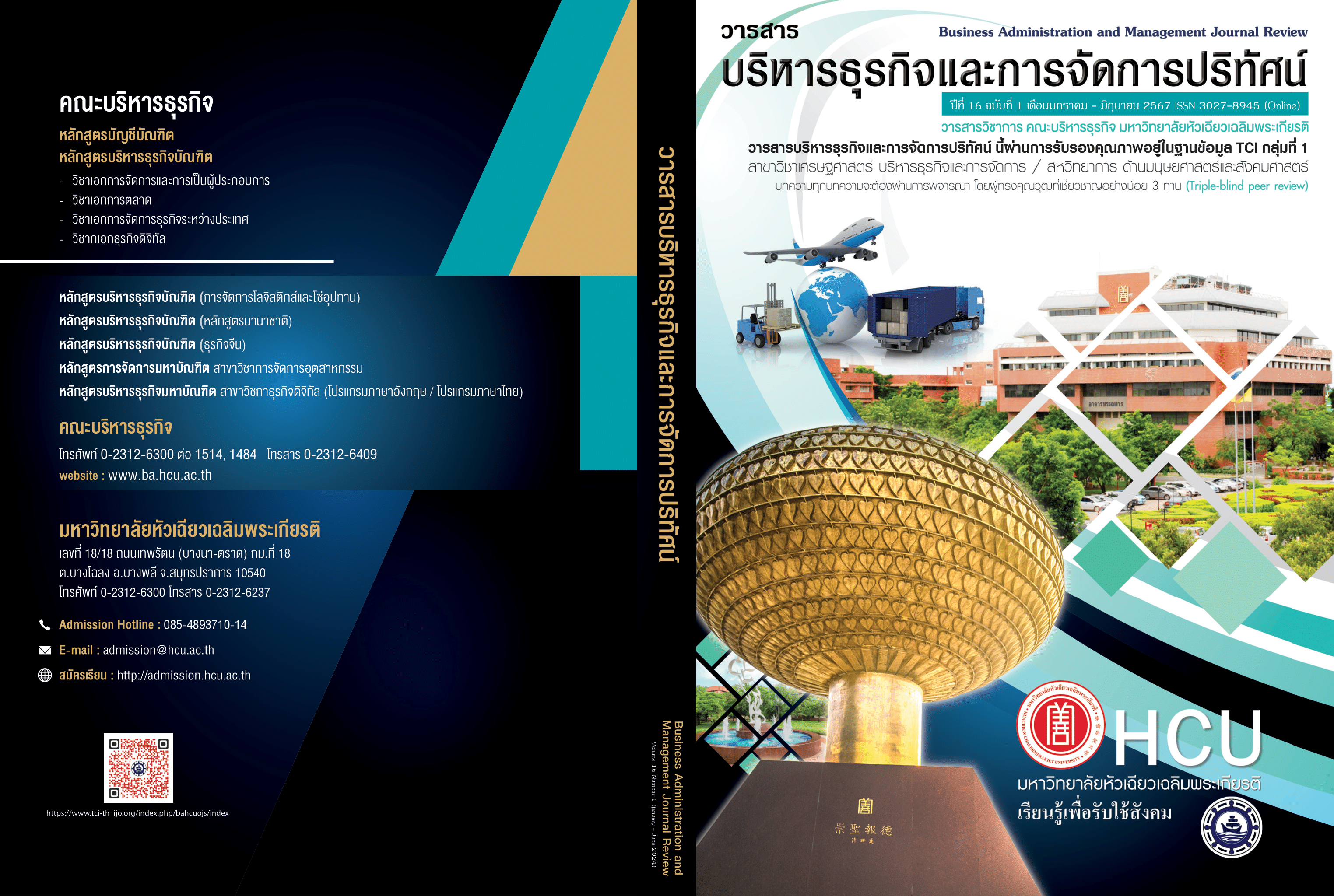Thai Household Debt and Psychology Based on Maslow's Hierarchy of needs Theory
Keywords:
Thai household debt, psychology, Maslow's hierarchy of needsAbstract
Household debt is money that financial institutions lend to individuals. Use the borrowed money for consumption, business, education, health care, and purchasing housing. Household debt is therefore an obligation for the borrower to repay the debt.
Household debt arises from personal needs based on the idea that things are necessary. According to the psychology of Maslow's Hierarchy of Needs theory, human needs arise from lack and when they are adequately met. The order of needs will increase, namely wanting complete prosperity for a good quality of life. Increased demand results in increased spending behavior of households. causing households to fall into debt traps Lack of liquidity and financial freedom. The way to deal with household debt is for households to have financial knowledge. To be used in planning spending and savings within the family to suit their status. and adhere to the Sufficiency Economy Philosophy to apply in life on the basis of being mindful, reasonable, fit and happy.
References
กรมประชาสัมพันธ์. (2567) การนำหลักปรัชญาเศรษฐกิจพอเพียงมาใช้ในการดำเนินชีวิต.สืบค้นเมื่อ 22 เมษายน 2567, เว็บไซต์: https:// www.prd.go.th/.
เจนณรงค์ เทียนสว่าง. (2560) ชุดวิชา 91350 การเป็นผู้นำ มนุษสัมพันธ์ และจิตวิทยาสำหรับเกษตรกร หน่วยที่9 แนวคิดเกี่ยวกับจิตวิทยากับงานส่งเสริมการเกษตร สาขาวิชาเกษตรศาสตร์และสหกรณ์. นนทบุรี :มหาวิทยาลัยสุโขทัยธรรมาธิราช.
ชนาภิวัฒน์ ขันทะ และ สุภาค์พรรณ ตั้งตรงไพโรจน์. (2564). หนี้ครัวเรือนไทยกับแนวทางแก้ไขให้ยั่งยืน. วารสารศิลปศาสตร์และวิทยาการจัดการ 131, 8(1), เดือนมกราคม-มิถุนายน.
ณดา จันทร์สม. (2566). หนี้ครัวเรือน : ความเปราะบางทางเศรษฐกิจและสังคมสู่ความไม่ยั่งยืน. สืบค้นเมื่อ 22 พฤศจิกายน 2566, เว็บไซต์: https://econ.nida.ac.th/.
ธนาคารแห่งประเทศไทย. (2566). EC_MB_040 เงินให้กู้ยืมแก่ภาคครัวเรือนจำแนกตามวัตถุประสงค์. สืบค้นเมื่อ 18 มกราคม 2567, เว็บไซต์: https://bot.or.th/.
ภัทรพล ใจเย็น และเดช ชูจันอัด. (2566). วิกฤติหนี้ครัวเรือนของไทยในยุคเศรษฐกิจโลกถดถอย : ปัญหาและทางออก. วารสารนวัตกรรมและการจัดการเชิงพุทธ, 6(4), เดือนกรกฎาคม-สิงหาคม, 213-223.
ลลิตา บุดดา. (2559). หนี้ภาคครัวเรือนกับวัฏจักรธุรกิจไทย. (การค้นคว้าอิสระ ปริญญามหาบัณฑิต).
มหาวิทยาลัยธรรมศาสตร์, คณะเศรษฐศาสตร์.
วนัชพร จามิต และบุฎกา ปัณฑุรอัมพร. (2566). ปัจจัยที่ส่งผลต่อภาระหนี้สินครัวเรือนเพิ่มขึ้นจากสถานการณ์โควิด 19 ของประชาชนในกรุงเทพมหานคร. มหาวิทยาลัยรามคำแหง.
สถาบันพระปกเกล้า. (2557). ปัญหาหนี้ครัวเรือนต่อเศรษฐกิจประเทศไทย. เอกสารวิชาการ การบริหารเศรษฐกิจสาธารณะสำหรับนักบริหารระดับสูง รุ่นที่ 13 หลักสูตรการบริหารเศรษฐกิจสาธารณะสำหรับนักบริหารระดับสูง.
สำนักงานสภาพัฒนาการเศรษฐกิจและสังคมแห่งชาติ. (2566). ภาวะสังคมไทยไตรมาสสอง ปี 2566, สืบค้นเมื่อ 14 กุมภาพันธ์ 2567, เว็บไซต์: https://www.nesdc.go.th.
อานันท์ เกียรติสารพิภพ. (2566). หนี้ครัวเรือน. สำนักงานเลขาธิการสภาผู้แทนราษฎร กลุ่มงานบริการวิชาการ 2 สำนักวิชาการ.
Downloads
Published
How to Cite
Issue
Section
License
Copyright (c) 2024 Business Administration and Management Journal Review

This work is licensed under a Creative Commons Attribution-NonCommercial-NoDerivatives 4.0 International License.
All articles published in the Business Administration and Management Journal Review are copyrighted by the journal.
The views and opinions expressed in each article are solely those of the individual authors and do not represent those of Huachiew Chalermprakiet University or any other faculty members. Each author is fully responsible for the content of their own article. Any errors or issues found are the sole responsibility of the respective author.




